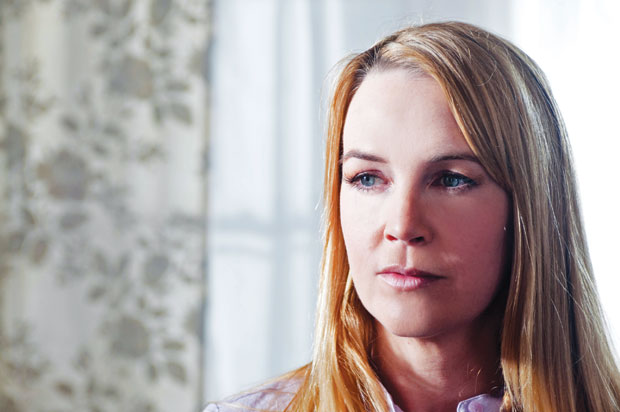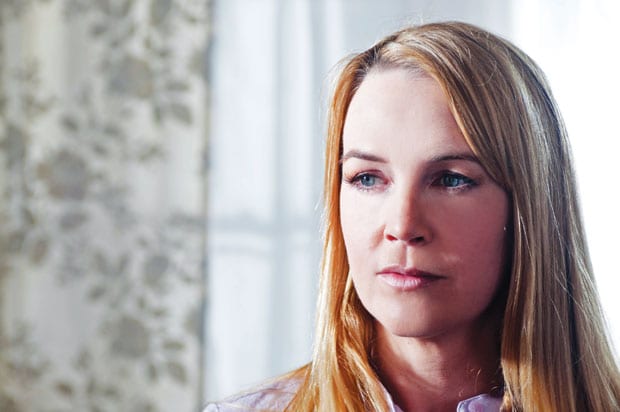More than a decade after her iconic role on ‘Xena,’ Texan Renee O’Connor plays in a contemporary story about family that hits home

XENAPHILE | Renee O’Connor — Gabrielle on ‘Xena’ — plays a woman hiding a devastating secret in ‘Beyond the Brightest Star,’ opening today.
JONANNA WIDNER | Contributing Writer
jonanna.widner@gmail.com
If you were a lesbian in the 1990s, it’s virtually certain that you remember actress Renee O’Connor. She played Gabrielle, the ass-kicker with a heart of gold and trusty sidekick of Xena (Lucy Lawless), the title character in the cult television show Xena: Warrior Princess. Since then, she’s started her own production company (ROC), played various roles in movies and plays, been divorced, re-married and had two children. She’s also written and directed films.
 But, of course, for our purposes, let’s begin with what’s important: She’s a Texan.
But, of course, for our purposes, let’s begin with what’s important: She’s a Texan.
You might not know that from Xena. Born in Houston and raised in Katy, O’Connor moved to New Zealand, where Xena was filmed, in the mid-‘90s, and she notes the experience distilled both the good and bad of growing up in the Lone Star State.
“The expansiveness of the country … I remember growing up and everyone said Texas is its own country,” she says. “I never quite saw the irony of that statement until much, much later, especially when I lived overseas for such a long time, during a very pivotal time, the 1990s. To be brutally honest, there were times I lived overseas that I was kind of unwilling to say I was from Texas.”
She got over it (more on that in a bit), and it’s a good thing, too, as O’Connor returned home to take on a primary role in the indie film Beyond the Farthest Star, a feature filmed entirely in Texas. The faith-based movie’s plot revolves around a preacher who must choose between his family and fame as a TV evangelist. O’Connor plays Maureen, the preacher’s wife.
It took more than a little while to get the independently-made film completed. Dallas Voice last interviewed O’Connor about the project in 2010, when she was doing principal photography in North Texas. Beyond the Farthest Star finally receives its Texas premiere this weekend, with at a red carpet opening in Plano Friday at which O’Connor will be in attendance.
“It’s a story of a family who stops relating to each other,” she says. “They do not know how to communicate, they move inside this house in complete isolation, and I found that extremely sad. So when I read the script, I was moved by the transformation the characters go through, I found it compelling.”
Over the years, O’Connor’s been very honest about growing up in a house with a stepfather who was both physically and emotionally abusive, and she found connections between her experience and her role in the movie.
“The underlying feel in this script and with Maureen is a sense of shame, of imperfection and it just feels like a burden on her heart. For more, growing up in a situation with domestic violence, you always had this feeling that you were different from everybody else, so I related to Maureen,” she says.
Speaking with O’Connor, you get the feeling that she’s come to terms with the pain caused by her childhood, and in fact that she’s developed into a kind, compassionate person (case in point: she’s still good friends with her ex-husband) — characteristics that, in fact, could be used to describe her character in Xena.
It’s easy to sort of forget, but that show, in all its campy, humor-filled glory, was practically revolutionary. Of course, there was the barely concealed subtext that Xena and Gabrielle were lovers (in an era when portrayals of queer couples on television were rare), but even more than that, there was the basic fact that this was an hour-long show that didn’t center on men at all.
“There was a beautiful sense of love and friendship and honesty and growth between two women that was never seen on television before,” O’Connor says.
The words “honesty” and “growth” swing us right back around to O’Connor’s thoughts about Texas and how they reflect her own personal journey. This go-around, her time filming in Texas gave her, she says, “a sense of comfort.” She notes that her attitude in the ‘90s has a larger context, one that envelops several themes, from her upbringing to her latest role.
“It plays right into that sense of shame,”
O’Connor says. “I didn’t see the bigger picture, that we don’t have to own it. The things that people can’t hold for themselves, that they can’t be accountable for themselves, we don’t have to own that. And it took me a long time to realize that.”
This article appeared in the Dallas Voice print edition October 18, 2013.

